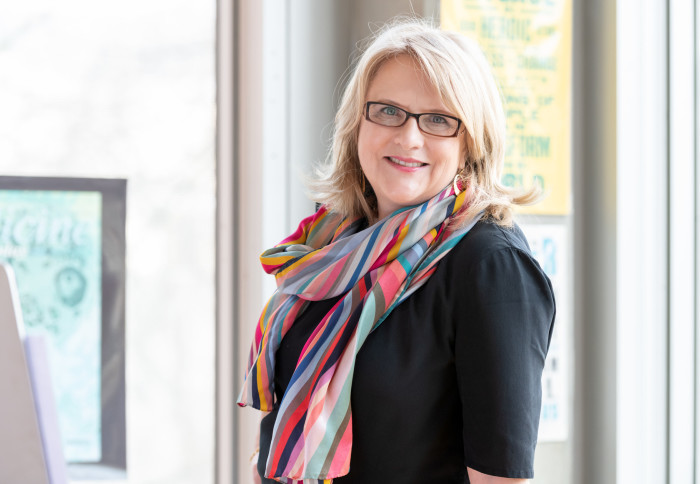Lockdown lessons share how Imperial scientists have responded to COVID-19

Imperial's Professor Sara Rankin has put together lessons to engage young people with science
A new series of educational lessons is teaching 16-18 year olds how Imperial has tackled COVID-19.
Curated by Professor Sara Rankin, of the National Heart and Lung Institute, the lessons are supporting young people who have transitioned to remote learning as a result of the pandemic.
Professor Rankin has created the Imperial COVID-19 Lockdown Lessons series to provide content for science teachers and inspire young people to consider studying STEM subjects at A-level and beyond. The lessons, which take place on YouTube, aim to make science accessible for young people and ease the burden on teachers struggling to engage students away from school.
Supporting remote teaching and learning
 Professor Rankin has worked with staff in the Student Recruitment and Outreach team and Events team to put together a total of 12 lessons. The first lesson was attended by 250 people and gained 900 views in the first 48 hours.
Professor Rankin has worked with staff in the Student Recruitment and Outreach team and Events team to put together a total of 12 lessons. The first lesson was attended by 250 people and gained 900 views in the first 48 hours.
“The most important thing for me is that these lessons teach young people how important science is in addressing global problems like COVID-19.” Professor Sara Rankin National Heart and Lung Institute
“I am involved in a lot of outreach work and quickly discovered that a lot of teachers were facing the challenge of transitioning to remote teaching overnight,” says Professor Rankin. “A lot of young people, particularly those from state schools and low-income families, are struggling with access to computers at home and may not be able to log in for remote online lessons.
“I knew there was some phenomenal research taking place at Imperial and I wanted to find a way to support both young people and teachers at a time when their education has been disrupted, which is why I decided to produce the Lockdown Lessons.”
Led primarily by Master’s students, PhD students and Postdoctoral Research Associates, the lessons educate students on a range of subjects, from how chemical engineers turn gin into hand sanitiser to what medicines are being used to treat patients with COVID-19. For Professor Rankin, it was important that the lessons highlighted the importance of collaborative work to achieve great science.
“All you need is a passion for science”
“I want to show that scientists working at Imperial come from all over the world, and that you don’t have to attend a Russell Group university to study for a master’s or PhD at Imperial,” Professor Rankin explains. “A lot of young people don’t see that scientists can often have a fluid career path. If there is one thing I want them to take away, it’s that all you need is a passion for science.”
One of the lessons has gained over 1,500 views on YouTube, and Professor Rankin hopes that teachers will be able to make use of the videos to continue encouraging science learning:
“The most important thing for me is that these lessons teach young people how important science is in addressing global problems like COVID-19.”
Nine of the 12 lessons have already taken place, and upcoming lessons include Dr Jakob Mathiszig-Lee, Department of Surgery and Cancer, on how they built a low-cost ventilator, JAMVENT, to help treat patients with COVID-19. Recordings of previous lessons are available on YouTube for anyone who missed the live versions.
Professor Rankin added: “Without the support of exceptional colleagues, these Lockdown Lessons could not happen. To all the scientists who have got involved - many of whom have been working in the labs or hospitals over lockdown - thank you for your time, willingness and enthusiasm to do this on top of high workloads. Especially for those new to outreach and the joy of live webinars!”
Article text (excluding photos or graphics) © Imperial College London.
Photos and graphics subject to third party copyright used with permission or © Imperial College London.
Reporter
Martha Salhotra
Communications Division